Does Beer Freeze? Answers to All Your Beer Storage Questions
If you’re a serious beer drinker, you’re not alone. Crafter brewers have taken the beer world by storm, and there are at least four times as many small breweries out there than there were back in 2009. You can sip on just about any type of beer you can imagine, from a local IPA to something fruity from several states away.
But if you’re going to invest in a collection of amazing beers to share with family and friends, you should know how to protect your investment. Improper storage can make your beer go bad long before it should, and that means wasting money — and possibly having a very unpleasant tasting experience! In the worst-case scenario, a beer bottle could explode on you, leaving you with a mess of broken glass and suds to clean up.
To get the absolute most out of your favorite brews, you need to know how to store them. To solve some of the biggest mysteries about beer storage, here are the answers to — and some of the science behind — your most pressing beer storage questions.
Does Beer Freeze?
Yes! You’ve probably put beers in your home freezer to quickly chill them for a crowd at your Super Bowl party, but woe to the person who forgets about a couple leftover brewskis in the freezer overnight. After several hours, beer will freeze, and the extra pressure that builds up in the bottle could force the cap off — or worse, cause the bottle to break. In that case, you’ll have some serious cleanup to do.
The reason you can keep your beer in the freezer for a little while is because alcohol has a lower freezing temperature than pure water. Beer also has sugar in it, which lowers the freezing temperature, too. If you’ve ever tried to freeze fruit juice, you know that you’ll end up with a grainy, slushy ice cube instead of solid one. This is because the sugar keeps water from freezing, and the first ice you get in a frozen beer will be flaky like that.
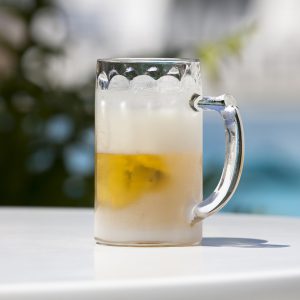
Can You Salvage a Frozen Beer?
Maybe. If you catch your beer when it is only partially frozen and the bottle is still intact, you can probably just put it in the refrigerator and drink it later. If there are still ice crystals in the beer bottle when you open it, be aware that the beer you pour will have a higher alcohol concentration than normal. This is because the frozen part is almost certainly pure water, and that leave behind all the beer’s alcohol suspended in less water. That will boost the overall percent alcohol content of your drink, giving you an extra kick.
For a really good beer, freezing and thawing may alter the flavor or aroma in ways you don’t expect — or enjoy. It’s probably worth tasting before you throw out a frozen beer, but if it seems off after a partial freeze, you can use it for cooking instead. Beer is great in marinades for meat, braising liquid for stews or as a flavor additive to fondue and chili. You can even use beer to make bread if you’re feeling adventurous.
What Is the Freezing Point of Beer?
It depends on the alcohol content of the beer. A stronger beer — that is, one with more alcohol in it — will freeze at a lower temperature than a lighter beer. This is because ethanol — the alcohol found in beer — has a far lower freezing point than water. While water freezes at 32 degree Fahrenheit, pure ethanol freezes at -173 degrees Fahrenheit.
Alas, no beer is made of pure alcohol. Most are somewhere between 4 and 6 percent alcohol by volume (ABV), though some do go up to 10 or 12 percent ABV. Because the alcohol content lowers the freezing point of beer, more alcohol means a lower freezing point — and that means you have more time before you need to rescue a beer can or bottle from certain doom in the freezer.
Each beer will vary based on its ABV, but a good rule of thumb to keep in mind is that a 10 percent solution of ethanol in water will freeze solid at 25 degrees Fahrenheit. That means that most beers with a standard 6 percent ABV will freeze before they get that cold. The average temperature of a home freezer is 0 degrees Fahrenheit, so you’re on the clock to remove those chilling beers within an hour or two.
Can You Leave Beer in a Cold Car?
If you live somewhere like Minnesota or Canada, you should be extremely cautious about leaving a case of beer in the trunk of your car for a long time on a cold winter night. Though your car will provide some insulation for a time, bottled beer will freeze below 25 degrees and leave you with a big mess to clean up.If you live in Florida, don’t worry about your cold beer causing you trouble overnight. Just don’t forget about it and let it heat up in the sun — sunlight can break down your beer and cause that awful skunked smell if your beer is exposed for too long.

Is There Ever a Good Reason to Freeze Beer?
Yes! Professional and home brewers sometimes freeze beer to make Eisbock, or ice beer. This is done by partially freezing beer and then removing the ice, which is just frozen water in the early stages. Because the alcohol is still in its liquid state, it stays behind in the beer. This is a way to raise a beer’s alcohol content without changing the recipe and flavors during fermentation.
If you’re really feeling adventurous, you might also try pouring out some beer into a shallow pan and freezing it to make beer slushies to cool you down on a hot summer day.
What Is the Best Temperature for Storing Beer?
Beer’s alcohol content also allows it to be shelf stable for quite a bit longer than most foods — that’s why it was invented in the first place. Most beers should be stored at 50 to 55 degrees Fahrenheit for longevity. This is traditional “cellar” temperature and matches the coolness you’d find in a root cellar or wine grotto. However, modern homes often have heated basements that are too warm for long-term storage of beer.
Likewise, your kitchen refrigerator is much colder than necessary for storing beer. The recommended temperature for a refrigerator that stores food is about 38 degrees, which many people consider too cold even for serving beer or all but the lightest beers on the hottest days. It’s a common misconception that an ice-cold beer has the best flavor, and most craft brews taste best served between 40 and 55 degrees.
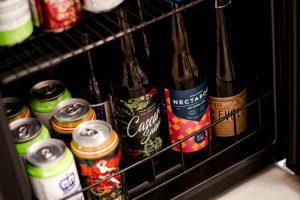
Photo Credit: Beer Me BC
Where Is the Best Place to Store Beer?
Because your house is likely too warm and your kitchen refrigerator is too cold, alcoholic beverages deserve their own coolers. A dedicated beer fridge is a perfect solution so your unopened bottles can have their Goldilocks moment: not too hot, not too cold, but just right. Choose a model that allows you full temperature control so you can store your beer at the right “cellaring” temperature and adjust it for serving based on the type of beer and your personal preferences.
A great beer fridge will also provide appropriate UV protection to keep out the harmful rays of the sun. Remember, it’s the extra light that causes beer to degrade and become “skunked,” so beers kept in a dark environment will last longer and be far more enjoyable when you do crack them open.
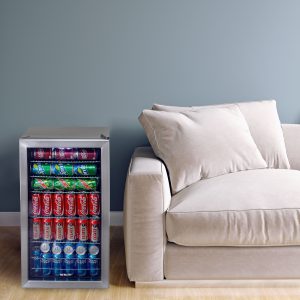
The Last Word
It’s definitely common to see people pop their beer cans and bottles into the freezer for a quick chill, but this could be tempting fate. Sure, you can store grain alcohol like vodka in the freezer to keep it cold and it will stay liquid forever, but that’s because vodka is typically 40 percent alcohol. All that extra ethanol lowers the freezing point well below the 0-degree mark of your home freezer, so that’s fine. Your beer and wine are another story altogether, so exercise caution. If you do choose to go for the rapid chill, set a reminder on your phone so you don’t forget to remove those bottles by the end of the night.
For truly best beer storage results, it’s well worth it to invest in a dedicated beer fridge to hold all your favorite brews. When you’re serious about taking in all the rich flavors of a small-batch brewed beer, storing and serving your brews at the proper temperature will ensure the best possible flavor and enjoyment. There are loads of models to choose from, whether you prefer a built-in cooler in a kitchen or a freestanding version for a man cave or home bar. Once you experience the convenience of having your beer always ready at the perfect temperature, you’ll wonder how you ever lived without your beverage cooler!


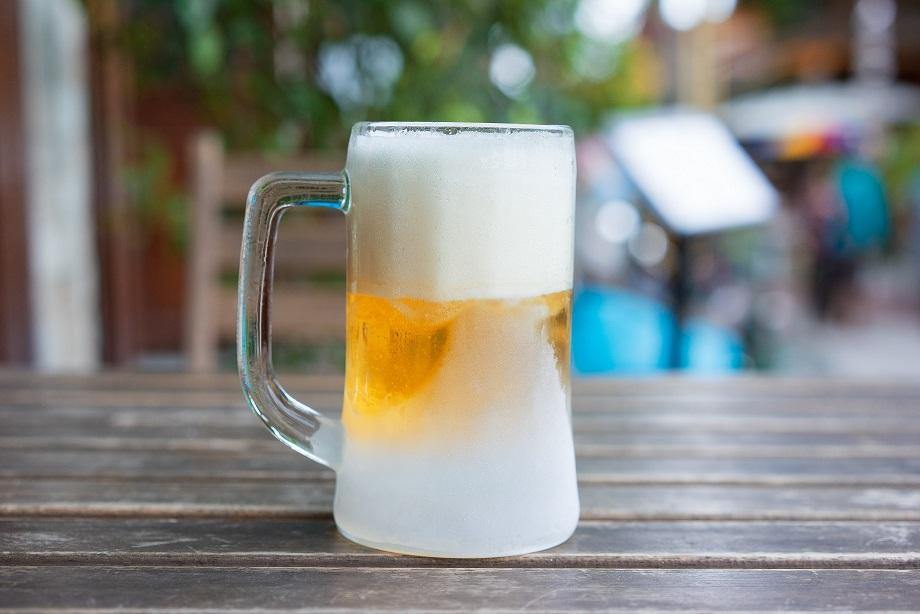
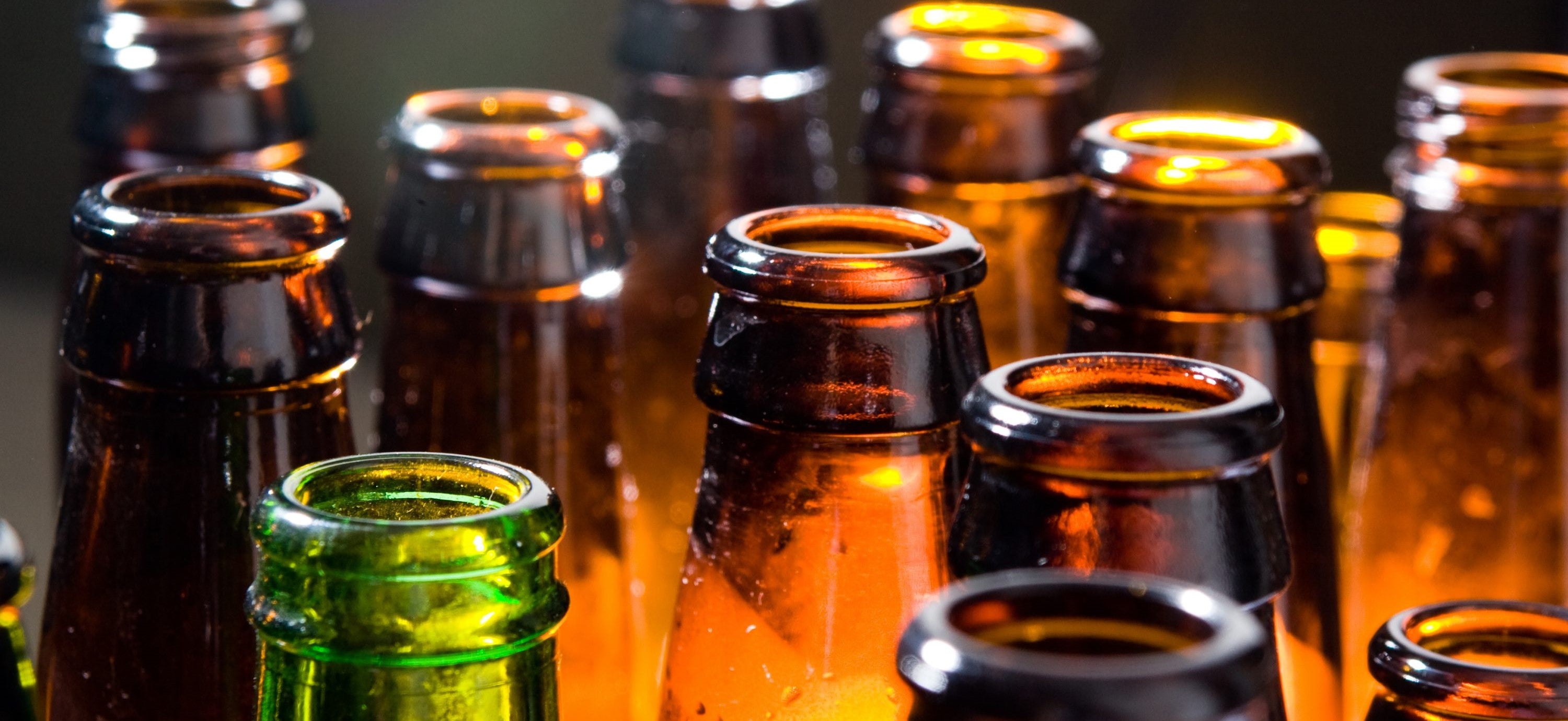
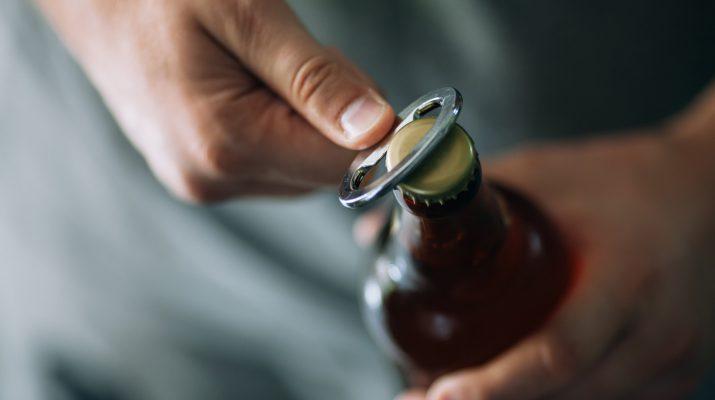
0 comments